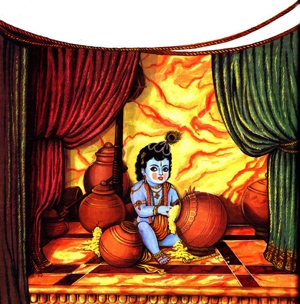I had a really interesting discussion with one of my oldest friends about the novel, The Life of Pi, the role of faith, and the idea of accepting things that lack a means to objectively “prove” them. Without ruining the novel (it’s fantastic, and was, I believe, the first book my book club read, 4.5 years ago; the movie rendition is very good, also), a key point is that faith is not something we (only) accept because our beliefs are “right,” but far moreso, because the immediate impact of some kinds of faith is an enrichment of our lives. Faith makes our lives colorful, magic makes our lives magical, and wonderment makes our lives wonderful. To those in a Western religion, this point may seen obscure, although a close look at Christ clearly suggests that he wanted people to have joy in their lives in earth, not (just) in the joy to come. It seems more obvious in the melody of eastern thinking – “Hark! The lotus flower is blooming!” – eastern thinking is very clearly concerned with enlightenment as something from which we can benefit in each moment, a benefit we’ve been missing out on in so many of our moments.

I have to say, Pi Patel may have been written by a white guy from Canada, but he feels like the older brother I wished I had, to look up to in the girlhood I wished I’d had
As a young Christian (my parents are Hindus, but Hinduism can be fairly giving to the idea of figuring things out for oneself… they did not really argue with or resist my interest in Christianity, driven at first by kinship with my third grade best friend, Andy, a preacher’s kid), much as I didn’t understand my gender identity, I did have an aching, eastern discomfort with the Gospel as late 20th century men preached it, which I couldn’t really explain. Now I can say simply that I am ready to accept the idea of this life as a training, as a honing. Like most people, and perhaps more than many of them, I rejoice at every victory, large and tiny, and I take pride in who I’m becoming. But what I cannot accept is the, to me, absurdist idea that this life of honing has as its ultimate purpose an afterlife in which there is no struggling, no difficulties or privations, no challenges, and no growth. The evangelist’s notion of heaven seems hell to me. I continue to believe in God, and to particularly believe that there is a deep structure* to life that links us together and provides meaning and context to our lives. But I believe most, like Pi Patel, my fictional countryman, in the enrichment faith and belief make in my every moment and every day.

I’ve been told I have a mischievous smile, that makes me seem like I’m up to something (albeit something good). I am. I suppose that it’s my heritage, as my namesake, Krishna, that avatar of wisdom and the courage to make right-minded decisions, was also known to play pranks on maids. I am not big on pranks, but I do see life as a game to play at, passionately, wholeheartedly, but for the love of it.
My friend’s point in bringing up this thing was in the analogy to accepting the idea of transness in another person**. The thing about being transgender is that it’s not something we have a blood test for, or even a questionnaire or other psychological instrument that can provide a valid and reliable*** “diagnosis” for us. The old standard of care (which really policed trans women far more than trans men, and policed far more than helped) was to ignore us. Hope we’d go away, and, if after a while, we had not, deny us and tell us we’re fakers, and then keep doing this until we can prove we can be ladylike in pumps and seamed stockings. Then maybe hormones and surgeries and a modicum of acceptance****. The new standard of care is to mostly just accept the statement at face value – mostly based on the principal that, if nothing else, who would really want to screw up their life like this if they were just playing around?
The claim is leveled unfairly at broader issues in cognition and psychology. We have reliable and valid means of identifying depression, anxiety disorders, OCD, cognitive problems secondary to a variety of causes, and many other things. My autism diagnoses are valid and reliable without having to do a blood stick or needing a specific genetic marker. So it’s really not true in that broader sense, but it is true when it comes to things like sexual orientation and gender identity. Even if we wanted one, we don’t have a valid and interpretable questionnaire that would correctly identify us, either pre or post hoc.
I think one thing cisgender people don’t really consider, however, is that most of us transgender people are our own biggest skeptics. I spent 38 years trying to be a boy and trying to be a man. I tried being a gay man – it turns out I make an even more terrible gay man than I make a straight man. I thought love would cure me and made multiple lengthy attempts with straight women to try and prove this point. A lot of people, especially now, transition much younger, but had it been 28 or even 18 instead of 38… That’s still a long time thinking about this. When I first came out, I’d say, “I think I might be transgender” or something sheepish like that. Sister, please. I don’t think, I know*****. I think people get this in my story, intuitively. Which probably goes back to how binary and how feminine I am. But out of the probably 200 people, to whom I’ve come out by now, only one tried to argue the point with me. In his defense, we’d just met, and he wanted me to be his boyfriend (dearheart, I’d make a terrible boyfriend to anyone, and I can give you references if you’d like to fact check).
Anyways, my life has become unimaginably richer in the just seven months or so it’s been since I finally accepted, on faith, this idea, which, on it’s surface, seems quite as crazy as believing in a white haired man looking down in judgment (I believe in God, for the record, but I think that conception of God is cray-cray). I’ve been told, so I don’t guess, now, by several people who knew me as a “man” and now also as a woman, that I make so much more sense to them this way, that I seem airier and now unceasingly bounce and skip through life these past months, and I see in the eyes of my friends that they are benefitting from this new faith, now (when I’m not even full time yet). The (vast) majority of these early people I’ve told have been thrilled to be “in” on the secret and to celebrate with me.
Let’s be honest, I was made to put on a cute dress and twirl around. But it’s not the dress that gives a bounce to my step. It isn’t the heels, cute as they are. It isn’t the makeup or the earrings. The twinkle in my eye doesn’t come from the contrast increasing benefit of mascara. The lilt in my voice isn’t voice coaching******. It’s the faith that puts the spring in my step and the twinkle in my eye. The faith in me.
* I’m appropriating this term from Noam Chomsky, because I think it fits remarkably well. Chomsky’s point, in essence, is that language cannot be understood by pure virtue of its surface features – the sounds, character shapes, and so on, because its deep structure lies in its communicating approximations of ideas that humans (and other creatures with language) understand with our brains. This explains why anthropologists and archeologists need Rosetta stones.
** I hardly ever throw a line to my trans friends who are always looking for excuses to call people traitors, and this is no exception… I am not going into the details, which go beyond my friend’s acceptance of my own journey, but he has nothing to prove as an ally to anyone.
*** Basically, reliable means that a test could be repeated, at least in principle, by different people at different times, and provide the same results; valid, which requires reliable, means that the test means what it claims to mean, because it can predict outcomes well, because it correlates strongly with other validated tests of the same condition, etc. Although most people don’t know it, most procedures used in most of clinical psychology are held to essentially the same standards of reliability and validity as “objective” biological tests used in medicine.
**** Jan Morris’s story shows that the standard of care, even back then, was unevenly applied, with far better treatment to educated, affluent women like her or me.
***** Embarrassing number of parentheticals by your shameless authoress, but I can’t resist the bubble gum comic joke. The teacher says, “Billy, what is the answer to this problem” Billy says, “What do you think it is, ma’am?” She says, “I don’t think, I know.” Billy says, “I don’t think I know, either!”
******* Now I’m just being impertinent. For the record, I am seeing a voice coach on Monday (it’s Saturday the 17th today… I write these blog posts in advance and schedule them out, and I’ll edit and add pictures later, because it seems wasteful to buy airplane WiFi to blog). I’m curious about what she has to say, but I don’t really think this is a big focus area for me, although if there are tweaks I can do, beyond what I do subconsciously and with a little iPhone app training, I’ll possibly do them. Jenny Boylan did this, though, and she felt like she mistressed (I must resort to a parenthetical to opine on my love for neologism, since a footnote within my sixth footnote in this blog would be ridiculous, even for me) it, but it felt insincere, and she stopped doing it. When I did the iPhone app, I felt kind of like this also, but anyways, we’ll see.
One of the things that convinced my parents to finally come around and make an effort to accept me as I am is that they can see how much happier I am this way– so I resonate strongly with this. It’s like you’re the girl version of me, sometimes.
Also, I love footnotes. But I don’t know how you would footnote a footnote, so I forgive the parenthetical.
your blog is wonderful … come check mine out at http://androguyandcathere.wordpress.com
Pingback: On Wanting Family | Mira Charlotte Krishnan
Pingback: Why I Believe in Magic | Mira Charlotte Krishnan